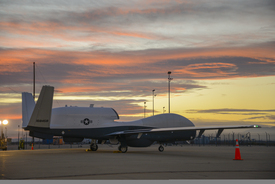Oct 17 2014
The U.S. Navy's second MQ-4C Triton unmanned aircraft system (UAS) has successfully completed its first flight. Operating out of a manufacturing facility in Palmdale, a Navy and Northrop Grumman (NYSE:NOC) flight test team conducted the 6.7-hour flight Oct. 15. The flight is a critical first step in preparing the aircraft to fly to a Navy facility in Maryland later this month.
 The second MQ-4C Triton, built by Northrop Grumman for the U.S. Navy, successfully completed its first flight on Oct. 15 (photo by Alan Radecki).
The second MQ-4C Triton, built by Northrop Grumman for the U.S. Navy, successfully completed its first flight on Oct. 15 (photo by Alan Radecki).
"Our team worked incredibly hard to get the second Triton ready for first flight, which will help us plan its ferry flight to Naval Air Station Patuxent River," said Mike Mackey, Triton program director, Northrop Grumman. "We're eager to continue working with the Navy during the next phase of Triton's flight test program to speed up its availability to the warfighter."
In preparation for a safe ferry flight, the aircraft will undergo a variety of ground checks and inspections.
Northrop Grumman is the Navy's prime contractor for the Triton UAS. Specifically designed for maritime missions of up to 24 hours, Triton can fly at altitudes higher than 10 miles, allowing for coverage of 1 million square nautical miles of ocean. Its advanced suite of intelligence, surveillance and reconnaissance sensors can detect and classify different types of ships.
The Navy's program of record calls for 68 Tritons to be fielded.